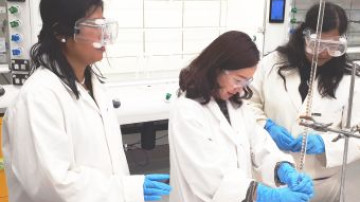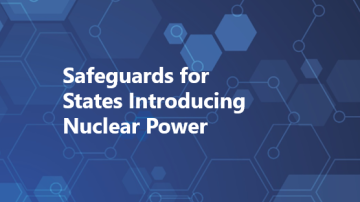Learning and training
The IAEA offers a wide spectrum of learning and training activities, as well as educational resources and capacity-building programmes. These include face-to-face training courses and workshops, fellowship programmes and schools on various nuclear-related topics. The IAEA also offers more than 120 online learning courses and webinars, from beginner to expert level, which can be accessed after registering with the Agency’s Nucleus portal (registration and login accessible when choosing a specific online course).
Self-directed
Risk Management in Technical Cooperation Projects
NEW!This course will provide you with an overview of the Risk Management Approach and Process followed throughout the Technical Cooperation Project Life Cycle.You will learn about the importance of risk management in the framework of projects that follow a Results Based Management Approach.After
Webinars
Roadmap towards Implementing a Deep Geological Repository
Side events organized by the Secretariat during the 65th General ConferenceImplementing a Deep geological repository (DGR) for radioactive waste is a central enabler of sustainable nuclear power generation and associated fuel cycle activities.
Self-directed
RTC1 - The fundamentals of using nuclear techniques for verifying food authenticity, Dunedin, New Zealand, 25 June – 06 July 2018
RTC1 - The fundamentals of using nuclear techniques for verifying food authenticityParticipants required 'Enrolment-Key' to access this course.
Self-directed
Safe Transport of Radioactive Material
Welcome to the Safe Transport of Radioactive Material e-learning Version 2.0.This e-learning covers transport safety in a comprehensive manner.
Self-directed
Safeguards for States Introducing Nuclear Power
Launching a nuclear power programme is a long-term commitment that demands strategic planning, resources, and readiness across many areas—including safeguards. This course introduces key safeguards-related topics that States need to understand and address when considering nuclear power.
Self-directed
Safety and Quality in Radiotherapy
Welcome to Safety and Quality in Radiotherapy!This e-learning program is designed to provide education for radiotherapy professionals regarding safety and quality in radiotherapy.
Self-directed
Security of Nuclear Information
This e-learning module is designed to provide a basic introduction to information security through exploring the following: Introduction to Information Security; Threats to information security; Frameworks for information security; and Information security incident response.
Self-directed
Seguridad y Calidad en Radioterapia
¡Bienvenidos a la Seguridad y calidad en radioterapia!Este programa de aprendizaje en línea está diseñado para proporcionar educación a profesionales en radioterapia en relación con la seguridad y calidad en radioterapia.
Webinars
Seminario web regional para países de América Latina sobre la arquitectura de detección de seguridad física nuclear: planificación, implementación y evaluación de operaciones de detección
Este seminario web se centra en elementos clave relacionados con la planificación, implementación y evaluación de operaciones de detección que tienen como objetivo eliminar o mitigar los riesgos del MORC.
Self-directed
Simulation for Cervical Cancer Radiotherapy
General Objectives : This series of microlearning videos present basic principles and practical aspects for conventional and CT simulation for cervical cancer radiotherapy.
Webinars
Social Media: Rising to the Social Media Challenge
This fourth webinar will focus on rising to the social media challenge as well as taking advantage of the opportunities provided by social media to strengthen stakeholder engagement efforts in nuclear power programmes.
Self-directed
Specific Considerations and Guidance for the Establishment of Ionizing Radiation Facilities
Many applications of nuclear science and technology require access to Ionizing Radiation Facilities. Self-reliance and sustainability are key parameters to consider during the design, development and utilization phases of these facilities.
- ‹ previous
- 31 of 44
- next ›












